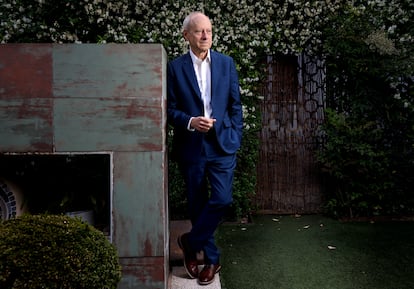Michael J. Sandel: ‘Trump isn’t stopped by the law, but by politics’
The influential philosopher warns of the president’s offensive to expand the limits of presidential power and laments that ‘a return to normalcy will be very difficult’

Some of the keys to understanding the new world taking shape in the first 100 days of Donald Trump’s second presidency can be found in the influential and prescient work of political philosopher Michael J. Sandel. From Democracy’s Discontent, which challenged the optimistic “end of history” narrative in the mid-1990s, to The Tyranny of Merit, which more than two decades later examined the legitimate grievances of the working class — the consequences of which are now starkly unfolding.
Speaking from his office at Harvard University, which has become a symbolic hub of resistance to what he describes as “the broad offensive against civil society” by an unrestrained president, this leading voice in contemporary progressive thought talks to EL PAÍS via videoconference about the depth of the current crisis and the scale of the challenges.
Question. A year ago, you warned that Trump would be even more dangerous if he won a second term. More efficient, less incompetent, and with fewer people around him willing to restrain his worst impulses.
Answer. Unfortunately, that prediction has proven true. In his first term, he was a real estate mogul and reality star who had no idea how to govern. And he appointed some more or less responsible people, who had some respect for the rule of law and imposed some restraint. But his defeat in 2020 angered and embittered him. It embarrassed him to the point where he denied his defeat. In the last campaign, he openly said his second term would be about revenge. And he’s surrounded himself with people who basically offered him a road map for exacting revenge using all the powers of the presidency, even some that don’t belong to the presidency under the Constitution. We’re seeing a broader revenge project than even anyone could have anticipated.
Q. Would you say that Trump is deliberately testing the limits of presidential power?
A. Yes. He knows that cases will come before the federal judges. Cases against unfair deportations, against the cancellation of student visas, against the arbitrary dismissal of federal workers… The way to extend his power is simply to violate the traditional limits of the presidency and flood the courts with cases. He’ll lose some, but he’ll win others. And ultimately, the Supreme Court will decide.

Q. Have we seen the most significant first 100 days of a presidency in modern history?
A. If some of those measures are corrected by the Supreme Court, then these first 100 days won’t be so significant in retrospect. If they are upheld, even if only some are, we would be witnessing a transformation of the U.S. political system. And to that we must add foreign policy. Turning his back on European allies, Canada, and Mexico. His hostility toward NATO and his abandonment of Ukraine, a conflict in which he has essentially switched sides. That will be very difficult to repair and will change the U.S.’ place in the world.
Q. Can things ever go back to normal?
A. Trump’s election to a second term and the aggressiveness with which he is using executive power make a return to normalcy very difficult.
Q. Many have been surprised by Americans’ tolerance for the authoritarian use of power. With few exceptions, there has been no response. Why is that?
A. The main reason is that the Democratic Party is in chaos. They don’t know how to respond. They’re divided. Some believe that Trump’s frenetic activity is counterproductive for him. For example, tariffs, which will increase inflation, which was one of the concerns that helped Trump win the election. So some Democrats want to give him room to self-destruct. Others believe that this is too passive and that it’s necessary to escalate the opposition. The question then is what the focus of the opposition should be.
Some Democrats, understandably, think that the first and foremost basis of opposition should be insisting on the rule of law. The problem is that the rule of law, although critically important for a democracy, is a weak foundation for a political project unless it connects to issues that the public really cares about. What would be more substantial?
Well, the other part of the opposition has been [Senator] Bernie Sanders and [Congresswoman] Alexandria Ocasio-Cortez, who have crisscrossed the country, including red states, holding anti-Trump rallies that have drawn tens of thousands of people, more than Trump’s own or Obama’s rallies. And while they mentioned the rule of law, their main focus was the oligarchic seizure of political power. Namely, how despite all the populist rhetoric and their success in getting working people out to vote, those populating the Trump administration and those who benefit from its policies are billionaires and large corporations. That has resonated most strongly, and it suggests that the only way for the Democratic Party to revive and be an effective opposition to Trump is to move beyond legal rhetoric.
After all, since Trump’s first presidency, Democrats believed that the law and legal procedures would finish him off: the Mueller report, the two impeachments. They’ve relied on the law and the courts to defeat him, and time and again, they’ve failed. Because Trump isn’t stopped by the law, but by politics. The Democratic Party needs to ask itself why it has alienated the working class. And it’s a political question, not a legal one.
Q. That legitimate resentment you were already talking about three decades ago…
A. The same force, right? You’re right, I’ve been writing about this since the first edition of Democracy’s Discontent. I was worried about it in the 1990s, in the days when there was confidence in globalization. The Berlin Wall had fallen. The Cold War was over. American-style liberal democratic capitalism seemed the only system still standing. We had reached the end of history. I didn’t believe it then. And the arrogance of that moment paved the way for Trump.
Q. And what about the weight of cultural issues? Perhaps we should change James Carville’s famous phrase to “It’s the culture, stupid”?
A. Yes and no. We need to rethink the sharp distinction between economics and culture. Because what matters is the source of legitimate resentments, and these are not entirely economic. It’s not just that the gap between rich and poor has widened. It’s not just wealth inequality. It’s also the growing divide between winners and losers.
When that economic inequality spills over into the divide between losers and winners, that’s where economics and culture meet. Those who landed at the top came to think that their success was their own doing, their merit, and that those who lost deserved their fate as well. And when working people feel slighted by elites, that’s partly economic, but also cultural. It has to do with respect, with dignity.
Yes, James Carville was wrong when he said, “It’s the economy, stupid.” A better way to put it would be: it’s the combination of economics and culture that leads working people to feel that elites look down on them, that their labor has no value, and that they therefore lack dignity. Well, we need a shorter slogan to replace Carville’s [laughs]. I’d say: “It’s not the economy, stupid, it’s dignity.” And dignity isn’t just GDP or the price of eggs.
Q. Why is wokeism so offensive to so many people?
A. Because it reflects arrogance. What’s most irritating about that ideology for many working people, especially white men, is that they, who are suffering, are being described as privileged. When, in fact, their life experience and economic prospects are not privileged. They are people who suffer to get by, but are unable to get ahead. That has to do with stagnant wages, combined with the lack of social mobility that the American Dream promised them. That’s already frustrating. But if you add to that someone telling you, you’re privileged, it’s irritating.
And then there’s something Democrats don’t understand: patriotism. That’s why the immigration issue is so potent. It’s not because people take Trump’s campaign rhetoric at face value. They don’t believe that foreign countries are emptying their prisons and mental hospitals and flooding the country with criminals who will steal jobs. They don’t buy into that, but they do believe that a country that can’t control its borders is a country that can’t control its destiny. That sense of loss of power, of loss of community, is a powerful sentiment that anti-immigration rhetoric captures and symbolizes.
Q. Have you detected any signs of hope in these 100 days?
A. There have been few. Except, perhaps, for the large turnouts at those Sanders and Ocasio-Cortez rallies I was telling you about. There’s something paradoxical about finding hope in an 83-year-old man, even if he’s partnering with a 35-year-old woman. I’m not saying my hope lies in those two political figures, but it does lie in the massive response to their efforts to focus on political issues. Did those demonstrations resonate in Europe?
Q. Yes, but you know: every day there’s something more attention-grabbing, and what came before gets buried.
A. And that’s part of his strategy. Flooding the institutions, the media, social networks, the information and communications system. This paralyzes the system’s ability to resist. They call it “flooding the zone.” A barrage of news, atrocities, controversies, disputes, even within his cabinet. During these first 100 days, Trump has deployed what he learned from reality TV. He knows that introducing new twists in the narrative, no matter how extravagant, draws attention. Chaos, drama, controversy. That lesson of reality TV is what we’ve seen him act out in these chaotic, frenetic first 100 days of his second presidency.
Sign up for our weekly newsletter to get more English-language news coverage from EL PAÍS USA Edition
Tu suscripción se está usando en otro dispositivo
¿Quieres añadir otro usuario a tu suscripción?
Si continúas leyendo en este dispositivo, no se podrá leer en el otro.
FlechaTu suscripción se está usando en otro dispositivo y solo puedes acceder a EL PAÍS desde un dispositivo a la vez.
Si quieres compartir tu cuenta, cambia tu suscripción a la modalidad Premium, así podrás añadir otro usuario. Cada uno accederá con su propia cuenta de email, lo que os permitirá personalizar vuestra experiencia en EL PAÍS.
¿Tienes una suscripción de empresa? Accede aquí para contratar más cuentas.
En el caso de no saber quién está usando tu cuenta, te recomendamos cambiar tu contraseña aquí.
Si decides continuar compartiendo tu cuenta, este mensaje se mostrará en tu dispositivo y en el de la otra persona que está usando tu cuenta de forma indefinida, afectando a tu experiencia de lectura. Puedes consultar aquí los términos y condiciones de la suscripción digital.









































